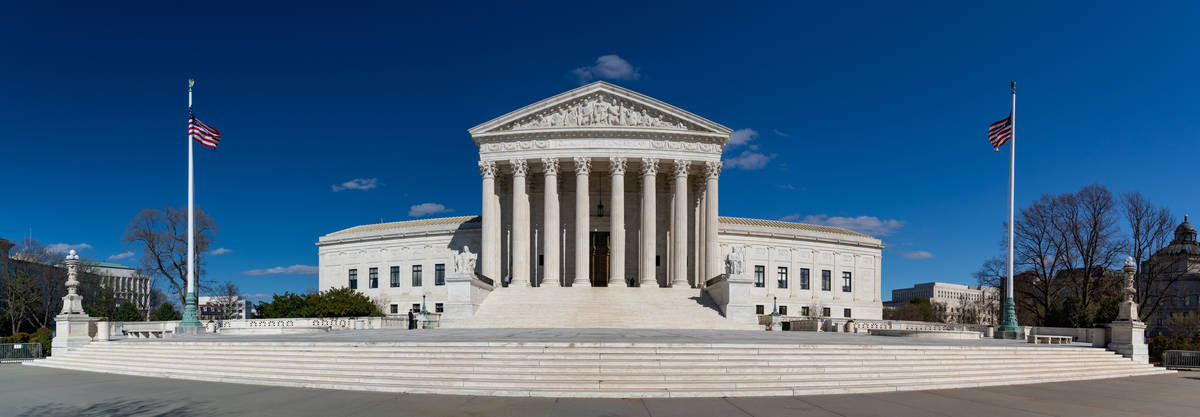Supreme Court rejects California church’s challenge
Chief Justice John Roberts again was the deciding vote Friday when the U.S. Supreme Court rejected a California church’s attempt to overturn the state’s coronavirus restrictions on in-person religious services.
In a 5-4 decision issued late Friday, the court upheld the state’s right to impose limits on congregations in order to slow the spread of COVID-19.
“Although California’s guidelines place restrictions on places of worship, those restrictions appear consistent with the Free Exercise Clause of the First Amendment,” Roberts said, in an opinion that denied a request by the South Bay United Pentecostal Church for relief from the rules.
The Chula Vista-based house of worship and Bishop Arthur Hodges sued Gov. Gavin Newsom, state Attorney General Xavier Becerra, state Public Health Officer Sonia Angell, San Diego County Public Health Officer Wilma Wooten, San Diego County Director of Emergency Services Helen Robbins-Meyer and San Diego County Sheriff William Gore over an order limiting congregations to 25% capacity or 100 attendees, whichever is lower. The plaintiffs told the court its services typically attract 200 to 300 congregants.
Worship services and nonessential retail were halted for more than two months in California, which has recorded nearly 107,000 confirmed cases of the coronavirus and more than 4,000 deaths.
During the lawsuit’s path through the lower courts, the state issued guidelines earlier this week allowing for a limited reopening, but that did not satisfy the plaintiffs, who felt the eased restrictions remained unconstitutional.
In rejecting that challenge, Roberts wrote that the Constitution generally grants broad leeway to state leaders in circumstances of medical uncertainty. In particular, the chief justice found that Newsom’s order was consistent in limiting not just religious services but also various kinds of activities “where large groups of people gather in close proximity for extended periods of time.”
“The notion that it is ‘indisputably clear’ that the government’s limitations are unconstitutional seems quite improbable,” wrote Roberts.
The court’s four reliably conservative justices — Samuel Alito, Neil Gorsuch, Brett Kavanaugh and Clarence Thomas — dissented, with Kavanaugh saying the guidelines violate the First Amendment because they “discriminate against places of worship and in favor of comparable secular businesses.”
While Roberts compared church to sporting events, concerts and other large secular gatherings limited by the order, Kavanaugh compared the church with spaces that were excepted from the restrictions, such as supermarkets. The court’s newest justice argued that, in this sense, the limits single out religious services.
“The state also has substantial room to draw lines, especially in an emergency,” he said in the dissent. “But as relevant here, the Constitution imposes one key restriction on that line drawing: The state may not discriminate against religion.”
In the suit, the plaintiffs said “thousands of churches across the country and in California plan to reopen by May 31, 2020 — the Christian holy day of Pentecost — in defiance of any state executive orders, leading to widespread civil unrest,” claiming that their suit thus “concerns an issue of widespread national importance whose resolution is needed to avert a constitutional crisis, which may occur without guidance from this court.”
The emergency application for writ of injunction relief went on to note that Newsom’s order issued May 7 allowed manufacturing and logistics facilities to open, all retail was allowed to open for curbside pickup, and “individual counties could open further after certifying to the state that certain statistical benchmarks were met.” As a result, the suit states, “offices, seated dining at restaurants, visiting retail and schools opened.”
It is this order the plaintiffs refer to in their suit, not about “the constitutionality of California’s prior executive orders issued in March that permitted ‘life-sustaining businesses to stay open.” But they said the May 7 order “is not neutral because it imposes special burdens on Plaintiffs because of their religious practices.”
The plaintiffs lost their bid for relief at the U.S. Court of Appeals for the Ninth Circuit, which they filed May 22. Citing precedent, that court said that “where state action does not “infringe upon or restrict practices because of their religious motivation” and does not “in a selective manner impose burdens only on conduct motivated by religious belief,” it does not violate the First Amendment.
Roberts was joined by Justices Ruth Bader Ginsburg, Stephen Breyer, Elena Kagan and Sonia Sotomayor.
In a separate case, the court also rejected a lawsuit from two churches in Illinois seeking to block Gov. J.B. Pritzker’s rule limiting religious services to just 10 worshipers. As part of Illinois’ reopening plans, Pritzker later modified the order to allow for up to 100 people at services, and the court denied the churches’ request for relief without a noted dissent.
California officials have said they plan to re-evaluate the reopening order in mid-June.

















